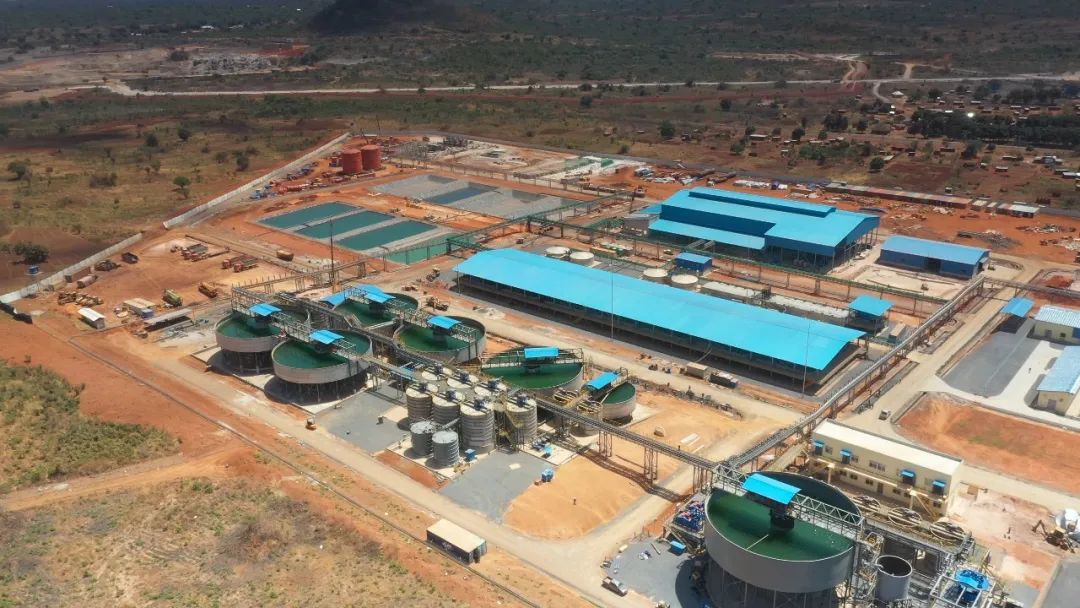Iron example for the application of blockchain technology
Iron example for the application of blockchain technology
2020 was not a great year for global trade. The superimposed influence of unfavourable factors such as global economic downturn and de-globalisation continuously impacted the global supply chain, and market uncertainty has risen sharply.
In the face of changes, China has put forward the timely “dual circulation” strategy, with internal circulation supported by external circulation, and with old infrastructure integrated into new ones. The 14th meeting of the Central Commission for Comprehensively Deepening Reform proposed that it is necessary to adapt to the new wave of technological revolution and industrial transformation trends, accelerate the development of a new generation of information technology and the integration of the manufacturing industry, and enhance digital, network, and intelligence.
With the push of new infrastructure supported by old infrastructure, the steel industry faces new challenges; externally, supply chain is unstable and there is risk in Renminbi exchange rate fluctuations; internally, it needs to coordinate traditional steel inventory, but also to meet the demand for special-purpose steel such as electrical steel, steel tower steel, and machine room steel.
As a modern business within a traditional industry, China Baowu Iron and Steel Group ("China Baowu") turned pressure into driving force, went against the current to look for change and innovation solutions, by introducing the first transnational blockchain letter of credit transaction settled in offshore Renminbi.
Based on blockchain technology, no paper document is needed throughout the entire transaction, and there is significant effect in improving the efficiency of document circulation and capital turnover, stabilising the supply of iron ore imports, and avoiding data risks, attracting great attention from the market.
Behind this landmark letter of credit, a platform called Contour provides technical support. Standard Chartered is not only the issuing party of the letter of credit, but also one of the shareholders and founding banks of Contour.
The advantage of blockchain in improving supply chain efficiency
The outbreak of the epidemic black swan in the first half of the year further increased the uncertainty of the iron ore pricing. The unpredictable bulk market has brought great challenges to large-scale raw material buyers such as China Baowu. Questions on how to ensure timely and stable supply to the greatest extent possible and how to reduce the impact of market fluctuations on the business itself were particularly important.
According to Tao Yuan, business director of China Baowu, under the current management requirements of low iron ore inventory control and streamlined procurement personnel, improving efficiency was particularly important for ore import trade. Although the epidemic had brought a certain level of impact on the supply of iron ore, maintaining close daily communication with suppliers and utilising the blockchain letter of credit platform for efficient iron ore transactions to ensure timely business connection, can help to ensure normal supply of iron ore.
The first full paperless Renminbi settlement iron ore letter of credit was born under this context, where it tried to solve the pain points of relying heavily on traditional paper work, including realising data sharing, reducing the probability of error, and reducing the time needed for modification.
On the other hand, traditional letter of credit settlement including application, issuance, notification, presentation, negotiation, mailing, reimbursement, and review, involve a large amount of documents and complex procedures, which can easily lead to errors.
In addition, traditional letter of credit involves importers, advising banks, exporters, negotiating banks and other institutions. All parties will generate their own data, forming their own "data island". Traditional intermediary banks can only notify each "island" separately, resulting in a long transaction cycle and slow circulation, which seriously drags down the capital turnover of the transaction party thus increases the opportunity cost of trade.
In comparison, blockchain letter of credit helps realise real-time data update and real-time sharing of all parties, breaking through boundaries of data islands and connect them with different partners to avoid errors in the transmission process. The data on the chain thus forms a self-certified closed loop, eliminates the process of manual review, and greatly improves the efficiency of cross-border trade.
Carl Wegner, CEO of Contour noted whenever information needs to be updated in the paper form of letter of credit, it must be updated level by level through importers, notification banks, exporters, and negotiating banks, which will take at least 7 to 10 days to complete. Therefore, in real transactions, buyers might compromise on discrepancies in the transaction in order to ensure that the goods can reach the ship in time at their own cost. In contrast, a blockchain letter of credit can be modified within a few hours, ensuring timely delivery and payment settlement.
High transparency improves transaction certainty and security
High transparency also brings high certainty. All participants in the supply chain can see information changes on the platform, with a good estimate for the next operation. This allows each link to respond in a timely manner and advance faster. "Compared with faster payment, it is more important to specify payment time, as both parties must complete one transaction before proceeding to the next. Therefore, the better the planning, the faster the goods can be transported, the more goods are sold, the less the credit line is occupied, the more of transactions, thus the larger turnover.” said Carl Wegner.
Additionally, blockchain technology can also form a record that is difficult to forge and tamper with every piece of data on the chain. In one hand, it allows companies to trace the qualifications of other companies in the chain for quality control, and on the other hand, it allows regulators to fully understand transactions and quickly identity risks to achieve ‘penetrating supervision’.
The trade risk of conventional letter of credit transactions still exists, and the real-time updated electronic letter of credit can help transaction participants identify potential financial fraud to the greatest extent. The risk of data fraud is more likely to occur in the context of unequal information, especially when “it is difficult to track files and to identify which is the latest file.” said Carl Wegner.
It is thus foreseeable that China Baowu, as the first domestic steel company that tried blockchain cross-border transactions, its experience may act as a case study for other companies in the industry to follow. The adopted standards are also expected to be further transformed into industry standard, opening a new chapter in the accelerated transformation of cross-border trade procedures and supply chain upgrades.
Jean Lu, Managing Director, Co-Head of Client Coverage Corporate, Commercial & Institutional Banking, Standard Chartered Bank (China) Limited, believes that financial technology is bringing profound changes to the mode of corporate operation and management. “The emergence of blockchain technology has shaken the world of cross-border trade and settlement, where the blockchain offshore Renminbi letter of credit has further enhanced the internationalisation of Renminbi. Standard Chartered is glad to partner with China Baowu, China’s largest steel group, and Contour, leading blockchain platform, as pioneers in this field.”
New space in the internationalisation of Renminbi?
It is worth noting that China Baowu has successively completed RMB cross-border settlements with Vale, BHP Billiton and Rio Tinto. Chao Ji, head of China Baowu’s raw material procurement, said that China Baowu imports a huge amount of iron ore each year, actively promoting the partial use of Renminbi for payment and settlement in iron ore transactions is not only a business need, but is also in line with the trend of Renminbi internationalisation, which is worthy of all parties within the industrial ecosystem to explore.
However, Chao Ji also said frankly that Renminbi settlement is expected to account for only about 2% of the cross-border iron ore trade this year. Although a certain amount of normalised settlement has been achieved with some suppliers, it is still far from achieving large-scale normalised settlement.
As a next step, China Baowu will continue to work hard to promote cross-border Renminbi settlement with partners in the ecosystem, help enhance the attractiveness and competitiveness of Renminbi as an international settlement currency, and enhance Chinese companies’ international presence to build a stable global supply chain.
Jean Lu also noted that Standard Chartered has a dedicated team that specialises in promoting the global application of Renminbi. It connects with central banks around the globe, shares the latest Renminbi internationalisation policies with them, and encourages Chinese businesses to use Renminbi for investment and financing settlement overseas to increase the global acceptance of the Renminbi currency.
The collision between emerging technologies and traditional industries has ignited a spectacular spark. Although this Renminbi-settled blockchain letter of credit transaction was only a test, a first of its kind, it provided sufficient guidance value. It is foreseeable that the application of cutting-edge technology will become a compulsory course for modern enterprises, leading the industry to more opportunities.
This article is a translation, original article published in The Paper.cn.
This material has been prepared by one or more members of SC Group, where “SC Group” refers to Standard Chartered Bank and each of its holding companies, subsidiaries, related corporations, affiliates, representative and branch offices in any jurisdiction, and their respective directors, officers, employees and/or any persons connected with them. Standard Chartered Bank is authorised by the United Kingdom’s Prudential Regulation Authority and regulated by the United Kingdom’s Financial Conduct Authority and Prudential Regulation Authority.
This material has been produced for reference and information purposes only, is not independent research or a research recommendation and should therefore not be relied upon as such, and does not constitute an invitation, recommendation or offer to subscribe for or purchase any of the products or services mentioned or to enter into any transaction.
Some of the information herein may have been obtained from public sources and while SC Group believes such information to be reliable, SC Group has not independently verified the information. Information contained herein is subject to change at any time without notice. Any opinions or views of third parties expressed in this material are those of the third parties identified, and not of SC Group. While all reasonable care has been taken in preparing this material, SC Group makes no representation or warranty as to its accuracy or completeness, and no responsibility or liability is accepted for any errors of fact, omission or for any opinion expressed herein. The members of SC Group may not have the necessary licences to provide services or offer products in all countries, and/or such provision of services or offer of products may be subject to the regulatory requirements of each jurisdiction. Any comments on investment, accounting, legal, regulatory or tax matters contained in this material should not be relied on or used as a basis to ascertain the various results or implications arising from the matters contained herein, and you are advised to exercise your own independent judgement (with the advice of your investment, accounting, legal, regulatory, tax and other professional advisers as necessary) with respect to the risks and consequences of any matter contained herein. SC Group expressly disclaims any liability and responsibility whether arising in tort or contract or otherwise for any damage or losses you may suffer from your use or reliance of the information contained herein.
You may wish to refer to the incorporation details of Standard Chartered PLC, Standard Chartered Bank and its subsidiaries at http://www.sc.com/en/incorporation-details.html.
© Copyright 2021 Standard Chartered Bank. All rights reserved. Copyright in third party materials is acknowledged and is used under licence. You may not reproduce or adapt any part of these materials for any purposes unless with express written approval from a member of SC Group.




